In the fiercely competitive smartphone market, companies are racing to leverage artificial intelligence (AI) to enhance their product offerings and streamline operations. Chinese smartphone maker Oppo is at the forefront of this movement, actively engaging in dialogues with tech giants like Google and Microsoft. With the impending launch of its flagship phone in international markets, Oppo is not only refining the user experience but is also venturing into the expansive realm of AI-driven technology. This strategic pivot underscores the increasing acknowledgment of AI’s potential in reshaping consumer electronics.
Oppo’s president for overseas markets, Billy Zhang, recently articulated the company’s commitment to understanding consumer requirements better through AI. By holding weekly discussions with some of the leading minds at Google and Microsoft, Oppo aims to dissect and address the specific “pain points” of its users. This grassroots approach highlights a refreshing angle that is often overlooked in large tech corporations: the importance of direct consumer engagement in the AI development cycle. Through collaborative efforts, Zhang emphasized a mutual goal of solving shared challenges, thereby fostering innovation through partnership.
Despite its robust growth in regions like Southeast Asia and Europe—accounting for 60% of its revenue—Oppo has consciously chosen a cautious approach toward penetrating the highly regulated U.S. smartphone market. This exemplifies strategic foresight, given the political landscape and trade tensions affecting technology imports and exports. Currently, Oppo holds a commendable fourth position globally in smartphone shipments, representing 9% of the market, as reported by Canalys.
As other tech giants such as Apple and Samsung dominate the market, Oppo’s ranking signifies its strong global outreach. However, the landscape is ever-evolving, with predictions suggesting that companies specializing in consumer applications of AI, such as Oppo and its competitors, may find a unique niche that could leverage their advantages over U.S. counterparts.
The forthcoming flagship model by Oppo is poised to be equipped with groundbreaking AI functionalities, including Google’s Gemini writing and recording tools and Microsoft’s content generation capabilities through OpenAI. By integrating these advanced AI features, Oppo’s smartphones are set to enhance user experiences, making everyday tasks more intuitive. Nevertheless, clarity is still needed regarding how existing Oppo devices currently employ AI technologies, indicating a future focus area for the company’s marketing and customer education efforts.
Oppo’s ambition extends beyond consumer-facing applications; the company has expressed a desire to revolutionize the manufacturing process. In a move towards greater automation, Oppo has replaced approximately 8% of its assembly line workforce with machinery, demonstrating a powerful shift in operational efficiency. This transition not only reflects the growing role of AI in manufacturing but also highlights Oppo’s strategy to allow its workforce to focus on higher-value tasks—thereby increasing productivity within the organization.
Oppo’s vision for the future includes employing AI technologies in its factories, which currently span multiple countries, including India, Indonesia, and Turkey. The digitalization of manufacturing processes allows for improved quality, cost efficiency, and overall responsiveness to market demands. Indeed, the company claims to have reduced manufacturing costs by nearly 40% in just three years, a remarkable feat that emphasizes the importance of technological integration in production lines.
The company is not alone in this endeavor; competitors are also exploring the intersection of AI and manufacturing. For instance, Honeywell’s recent collaboration with Google’s Gemini aims to develop AI assistants specifically designed to support factory workflows. This trend signals a much broader industry shift towards AI solutions that can enhance operational efficiency—an avenue that is ripe for exploration by tech companies globally.
The AI smartphone market is projected to experience explosive growth, with shipments of AI-enabled devices estimated to surge from 46 million last year to a staggering 732 million by 2028. This prediction aligns with the current focus on generative AI capabilities, marking an impending transformation within the industry. However, industry experts warn that the level of complexity in these new features remains undefined, indicating both opportunities and uncertainties on the horizon.
As companies like Oppo navigate this turbulent landscape, one thing remains clear: the intersection of AI and consumer electronics offers unprecedented potential for innovation. The company’s strategic investments and partnerships underscore its commitment to leading the charge as it aims to elevate user experiences through transformative technology. Ultimately, Oppo’s future endeavors could play a critical role not only in its trajectory but also in shaping the broader smartphone market in the age of AI.


Leave a Reply